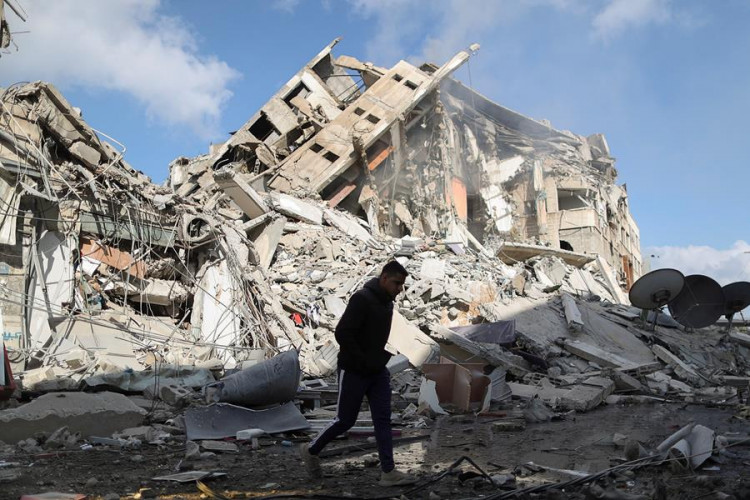In a harrowing incident in Gaza City early Thursday, over 100 individuals lost their lives with hundreds more injured as a desperate crowd, gathering for humanitarian aid, turned chaotic. According to local media and health officials, the tragedy unfolded when Palestinians, in a rush to access trucks laden with aid, were met with gunfire, leading to a deadly stampede.
The circumstances that led to this catastrophic event are still being pieced together, with conflicting reports about the involvement of Israeli troops. Some accounts suggest that the Israeli military opened fire as the crowd surged toward the aid trucks, while the Israeli Defense Forces (IDF) maintain that the fatalities were largely due to the stampede, with limited engagement from their forces.
Ashraf al-Qidra, a spokesperson for the Gaza Health Ministry, labeled the event a "massacre," reporting a death toll of 104 and around 760 injured. The IDF, on the other hand, released a statement and aerial footage showing the chaos, indicating that the pandemonium was primarily due to the crowd's rush and not direct military action. They acknowledged that a small number of civilians might have been injured by their forces in the turmoil.
Eyewitness accounts from the scene described a nightmarish scenario with "dozens or hundreds" of individuals found lifeless or severely injured. The medical infrastructure in Gaza, already stretched thin by the ongoing conflict, has been overwhelmed by the sudden influx of casualties. Hospitals like the Kamal Adwan Hospital struggled to provide even basic care, with Dr. Hussam Abu Safia highlighting the dire need for urgent surgical interventions that the facility could not accommodate.
Aid was dropped into Gaza and witnesses say Israel opened fire at them while they were going to get it.
"At least 104 Palestinians killed and 760 wounded" according to Al Jazeera.
Massacre.
Crimes against humanity don't get clearer than this. #GazaHoloucast… pic.twitter.com/uHE299fY9J — Umer Khayam (@KhayamTV) February 29, 2024
The political fallout from this tragedy has been immediate, with Hamas, the governing body in Gaza, holding Israel, alongside the administration of President Joe Biden, accountable for the "ethnic cleansing" of Palestinians. This incident has sparked international condemnation and calls for protests against Israel's military actions in Gaza.
This latest tragedy adds to the toll of the Israel-Hamas war that erupted following a border incursion by Hamas militants on October 7, leading to a large-scale Israeli offensive across Gaza. The region, particularly the northern parts, has faced severe isolation and devastation, with the entry of aid being a contentious and dangerous endeavor.
International reactions have been swift, with Arab nations condemning the violence and President Biden expressing concern over the impact on ceasefire negotiations. The United Nations Security Council convened emergency consultations, reflecting the global alarm over the escalating humanitarian crisis in Gaza.
"This latest event needs to be thoroughly investigated," White House spokesperson Olivia Dalton said on Air Force One. "This event underscores the need for... expanded humanitarian aid to make its way into Gaza."
"When it comes to what happened in Gaza today ... I must say I think this is a nightmare," Canadian Foreign Minister Melanie Joly on Thursday told reporters in Ottawa. "We need to make sure that international aid is sent into Gaza and that people are protected when they go and get that aid."
The incident has further complicated efforts to secure a ceasefire, with mediations by the U.S., Egypt, and Qatar being delicately balanced against the backdrop of the upcoming Muslim holy month of Ramadan. Despite the urgency, a resolution appears distant, with both Israel and Hamas holding firm on their demands.
As the international community grapples with the implications of this tragedy, the pressing issue remains the dire humanitarian situation in Gaza, where millions face starvation and displacement. The need for a sustainable resolution has never been more critical, as the cycle of violence and suffering continues unabated in the region.




